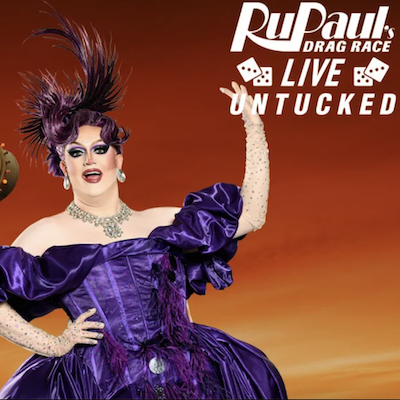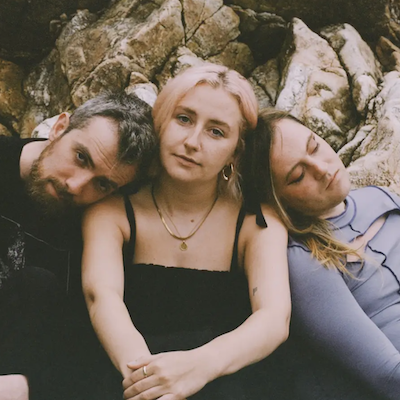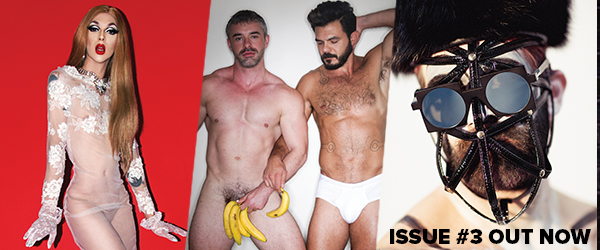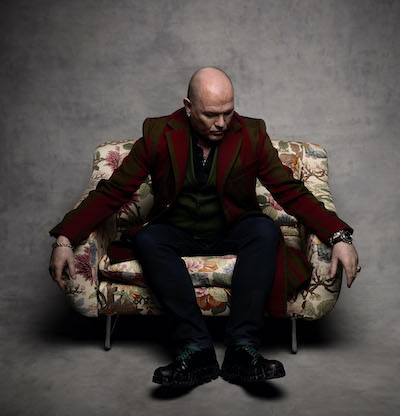
There’s a well-known photograph by artist Gregory Crewdson titled Untitled (Boy With Hand in Drain). It depicts a sweet suburban boy in a bathroom, reaching his hand through a drain, crossing a boundary into an eerie, unknown subbasement. This image perfectly evokes the boundary in Gavin Friday’s work, balancing the beautiful pop of songs like “Angel” with the Gothic violence of the Virgin Prunes, the sacred with the profane. Ecce Homo, his first solo work in 13 years, produced by Soft Cell’s Dave Ball and Michael Heffernan, continues these themes, tackling societal pressures, political frustrations, and exploring beauty, grotesque, and romanticism. Loverboy’s Features Editor and Professor of Punk George Alley sat down with Gavin Friday to discuss a career spanning decades of creativity, defiance, and reinvention. Reflecting on his groundbreaking contributions to music and art, Friday shares insights into the personal themes and collaborations shaping this album, his relationships with longtime friends like Bono, and new creative partners. Friday offers a raw, reflective look at the experiences, passions, and beliefs fueling his artistry.
Ecce Homo arrived on the 25th of October. It’s your first new solo album in 13 years. How are you feeling?
You know, you finally give your baby to the world, and it’s no longer yours. So, you’re in that sort of twitchy way. You’re twitchy. But that’s good. That’s good.
I know from my own personal experience, when you’ve been working on music privately for a long time, it can be briefly jarring to open the doors and windows for interpretations. But I’m sure it’s also exciting, as you get to relive the world you went into again.
Yeah, and you get surprised by how differently people interpret or hear stuff. I like that. It’s difficult sometimes. Some of these songs on this album are so personal—like, I’ve written like I haven’t written before. I’m not being ambiguous, and you’re sort of outing yourself. Do you feel that way?
Yes, absolutely. I was wondering, since you were working with Dave Ball (of Soft Cell), going back and forth, sending files between each other, did that make it more intimate for you compared to working in a studio?
It did, in a weird way, make it more intimate. That’s an interesting way of looking at it because I had worked with Dave Ball in the heyday of the Virgin Prunes and Soft Cell in the ’80s, and he produced the last Virgin Prunes album. I hadn’t seen him since 1985, and I got an email out of the blue about 11 years ago, asking me to do a cover of a Suicide song (‘Ghost Rider’). I fucking loathe Suicide, but it was remote, and it was quite magical; he’s such a gentle giant. And then I went, “That was great. Do you have any more?” Then a couple of months later, he’d send something else. It was like we were back in the mid-80s. After some time, I went to the engineer I worked with, Michael Heffernan, who also co-produced the album, and I said, “We’ve got something here.” I realized we had an album. I wanted it to have that lush, cinematic feel, with horns, cellos, and melodrama. Music that brings you into a world—I’m always a bit messed up by the stuff I fell in love with first.
Yes. I know for you, that’s Bowie, isn’t it?
It was Bowie. I was 12, and it was the first thing that made me feel normal. I didn’t fit in with anything Irish kids did, and Bowie told me it was okay. I got my ears pierced, wore eyeliner. Music does that for people at any age—it gives them a friend. I was obsessive. There are very beautiful things music does for kids or anyone at any age, and he was a diviner. If Bowie mentioned Burroughs, I’d read Burroughs. I hadn’t a fucking clue at 12 or 13 what Burroughs or Gainsbourg was about, or that ‘The Jean Genie’ was about Jean Genet. Try reading Jean Genet when you’re 12 or 13—you have no fucking clue.
Even though I was using the imagery of Bowie as a shield against the harsh world I was in, which was the Northside Dublin in the ’70s, when punk came along, it gave me the keys to a car. I saw the Roxy Music’s and the Bowie’s as some sort of divinities that lived in the ‘University of Magic’ and how no one can do what they can do. Punk rock sort of came along and said, ‘DIY, you can do it’. You don’t need to fucking go to university, grab a guitar. If you don’t know what to say then say, ‘I don’t know what to say’. It was such a godsend, punk rock.
I’m sure Bowie and Bryan Ferry seemed like aliens, while people like John Lydon (of the Sex Pistols) presented as ‘real’ people.
Yeah. My first gig was Bowie. I was 16, and I had to sneak away to London from Dublin without telling my parents. I was queuing at Wembley, dressed in bell bottoms and platforms, and saw punks across the street. It was 1976—there was war, bombing, terrorism with the IRA, and here were these punks. I came back telling my friends about this new look. My mom, a dressmaker, transformed secondhand clothes, which was key when we were starting the Virgin Prunes. So, I could bring any clothes in secondhand store, take them into drain pipes, cut that jacket up, and she ended up making the Virgin Prunes dresses.
The Virgin Prunes had such a different look compared to what was happening in London.
It was a different look. We were in a more repressed society than London. In Ireland, we were under the wrath of the Catholic Church. Books were banned, divorce only happened in 1999, and homosexuality was legalized in 1994. Abortion came in three years ago. So, we were singing about very different things to the UK kids of ’70’s and ’80’s. So the dress thing; I was bullied a lot as a kid. You’d get called queer before you had pubic hair. Punk gave me the energy to say, “You call me queer? I’ll wear a dress.” I didn’t wear a dress like Boy George did later, who was phenomenal as in what he did for homosexuality. I wore a dress, and you didn’t know if I was gonna kiss you or kill you. It was my shield.
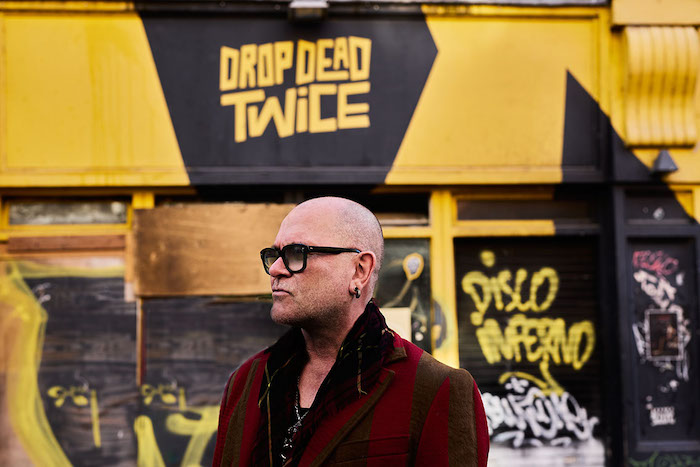
I remember seeing Virgin Prunes performances, via VHS tapes I traded with other people from listservs as a weird gay kid in Ohio. Things like ‘Come to Daddy’ were powerful to see in that mix of punk and different representation of sexuality.
It was hardcore. We weren’t lovey-dovey. We re-released some of the Virgin Prunes stuff on BMG in the last 2, 3 years, and we still are about to release more. Some of those BMG people who are half my age say if we were 23 now, we’d fit right in. That’s great to hear, back then, we nearly needed bodyguards just to walk down the street. Kids used to get dressed in the venue because to get on the bus, to go down the street, to look that way, you’d be fucking dead before you get there. I could take down a few houses if I got really angry, but I couldn’t hit a fly. I don’t know how to fight. But that defiance, it makes you strong. It’s like saying, “This is me, don’t tell me what to do.” Does that make sense?
It makes perfect sense to me. That defiance, is that what makes you want to create art?
To be honest, when it all happened, it was like a planned accident. I didn’t think at 16 I wanted to be in a band. I wasn’t the guy playing the guitar learning the hooks, just punk happened and I went, this is it. It was like an exorcism that saved me where I could get rid of the shit that I didn’t like around me verbally and musically and visually. The real blessing was I went to Europe, we were totally embraced in France Germany, Holland and Belgium and toured for years; you start learning about music, like other than just punk rock.
Suddenly I discovered Jacques Brel and it changed. He’s probably as a performer, my biggest influence much more than Bowie. I wouldn’t be like Bowie live at all. It’s just that visceral expression thing that he had. But I started learning about Kurt Vile and Serge Gainsbourg and just even Jazz. So when the Virgin Prunes ended I remember me and Guggi getting off stage in Holland once, and I went, ‘They all look like me and you now. They’re dressing like you and me. That’s not what we wanted’.
They were dressing like clones.
It’s like a compliment on one level, but that wasn’t the band’s purpose. And at the same time, in your mid-20s, life gets in the way—money, or the lack of it, people start wanting to have girlfriends or boyfriends, babies, or jobs. It was only around my late 20s that I decided, no, I want to be a performer. I opened a cabaret club called the Blue Jaysus, which is slang for Jesus. I’m so anti-Catholic Church, but the imagery is everywhere. If you walked around my house, you’d think, is he a priest? But maybe your oppressor becomes part of your DNA in some way. I started working with classically trained musicians, then met the classical composer Gavin Bryars, the Philip Glass of the UK. And he said, “I’d love to use your narrative voice in a Shakespeare company.” I went down that road for a while, and then I just kept jumping instinctively; I’m not on a conveyor belt of record, break, tour, repeat.
When I think of the grotesque, I think of playing with the boundaries between beauty and ugliness. I feel like your work often does this—whether in moments of extreme beauty or dark, archaic subject matter. The new album, with songs like ‘Stations of the Cross,’ is no exception.
I think you hit it right. I don’t think it’s a conscious thing. I love drawing an audience in, and they go, “Oh, this is beautiful,” then ripping up the curtains and saying, “Fuck you.” Not to annoy them, but to make them think that it isn’t all lovey-dovey. People say, “Oh, I love ‘Angel’” (notably featured in Baz Luhrmann’s Romeo + Juliet soundtrack). Then they see me live and think, Whoa. It’s not like you’re gonna get two hours of Angel. They say that most singers or writers have five or six songs they keep rewriting in different modes. And most painters make five or six paintings and keep repainting them. Do you know what I mean? Some things happen spontaneously.
You previously mentioned your mom. Was that connection with her what led to ‘Amaranthus’?
My mom had Alzheimer’s, and I was looking after her a bit, and we had this tune. I was sort of angry that she had Alzheimer’s because we always had a good relationship. I mean, whose mother makes dresses for them? Well, not many, back in Dublin. I remember when she had to go into a home because, you know, it’s like the invasion of the body snatchers, Alzheimer’s. I visited her twice a week, and on Mondays, all the ladies had their hair and nails done and their makeup. I remember going in, and the attendant said, “I just wanted to tell you, we had no choice in what she did to herself. She asked for this.” I walked into her room, and she had black nail varnish, black lipstick, and an all-white goth face. I thought, Oh my God. She’s gone back to the 1980s. She’s a Virgin Prune. She’s like, she’s making the dresses, and there I was with the black hair and the makeup. And then ‘Amaranthus’ happened. She used to grow that plant in the back garden, and it means love lies bleeding, and it just clicked, like something Siouxsie and the Banshees would sing about.
Like something off Juju! Tell me about the tattoo you just got to commemorate ‘Ecce Homo.’
This album, Ecce Homo, means a lot to me. It means behold the man, as in here I am, but it has many other connotations. It’s the last thing Pontius Pilate said to Jesus Christ. It’s Nietzsche’s biography. It’s George Grosz’s, the German expressionist painter’s, biography. It’s a lot of things. But to me, the title song came when Trump became President, and I got so fucking angry. It was almost like he set fire to a fuse that gave the far-right permission to become powerful again and to express their opinions. So we started seeing these fundamentalist, far-right fuckers coming up everywhere. I thought, well, fuck them. It’s anti-fundamentalism, anti-religion, anti-far-right. When I thought of the title Ecce Homo, I knew for English-speaking countries the word homo would hit hard, but I like that. I like rubbing the word homo in their faces. There’s still that brattishness in me. But this song has nothing to do with sexuality at all. It’s just so powerful to say those words.
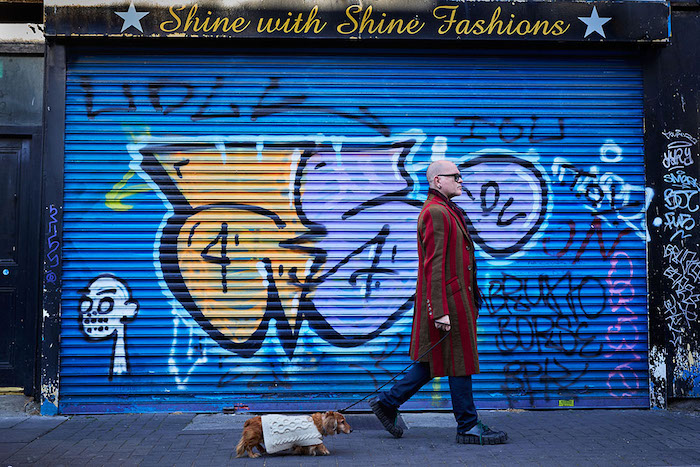
There seems to be a commentary on the album, about how we’re being controlled by media and the larger spectacle. Like the Situationists did back in the mid-20th century, you’re reminding people to détourn, to tell people they’re being overridden and controlled by larger hegemonic structures telling us what to buy, what to value, etc.
Well, there’s a song, ‘Daze,’ and it’s very much about that. Sometimes… we all slip into it. The phone is a dreadful thing. It’s even more dreadful for younger people because at least we’re somewhat aware that it has to be turned off. Don’t bring it to fucking bed, or you won’t sleep. The anxiety of all the information coming at us from every direction—there are so many opinions, so much positivity and negativity, all at the same time. You can actually fucking have a breakdown if you don’t chill the fuck out.
I enjoyed the playlist you just published. You’ve always been a collector.
What it is, is everything has gone digital and into stories. I thought, okay, I’m announcing my album Ecce Homo, which means “Behold the man.” I’ll show pictures of myself over the last 40 years. I’ll build it up. And at the same time, I thought I’d start playing albums and songs that I’ve loved over the last 40, 50 years, from ‘72 on, when I first really got into music. So all it is, is me delving into my record collections and boxes and going, Oh, God, I remember when I used to think they were the best thing in the world. I mean, the latest one I just put up this morning, and I still fucking love the song—it’s the Smashing Pumpkins’ “1979.” I still go nuts when I hear it, and I’m in my 60s. What a great song for pop rebellion.
What’s happening next?
I want to start playing live. We’re not gonna do that till next year. I’m gonna do a Q&A and launch the album in Dublin [done on October 25th]. We still have Tower Records, thank God. It’s a fucking great store in Dublin. I’m still a junkie for physical books and albums, although we have to embrace streaming. So there’s some promo stuff, videos, but really, it’s about playing live. And it’s so difficult, George, because I want all the music. I want it to be big. You see more and more bands that can’t even go down the road. I mean, you get on a plane, you get to New York, get a hotel, a flight or a train, a sandwich, and two meals—how much does that cost? Try bringing a drum kit, a synthesizer, a tour manager, and a lights guy. You’re fucked. You go, Are you kidding me that it’s $80 for a bottle of wine? I used to get a bottle of wine for $30, and now it’s $80. What’s going on? I really want to play. I don’t want to just do a bespoke tour of four weeks around Europe. I want to go to America. I want to go to Australia. I’m gonna have to perform a lot because in 15 years, I might be in a wheelchair. I just want to perform because I love it, and I’ve neglected that side of me. I’ve neglected it so much. But in a weird way, I had to because life gets in the way. Shit happens.
You were just working in Vegas, right?
I was. When I work with U2, I’m more in the creative element, getting the idea up and going. So, yeah, unfortunately, it was seven weeks in Vegas, which is really fucking—you know what Vegas is like.
I mean, I’ve never been there for more than two days…
Yeah. And you were probably happy to get on that plane. But the good thing about The Sphere is it’s quite extraordinary. There’s no gambling in it. But what I love about working with U2 is that they’re always pushing the boat out, pushing the envelope, doing something that hasn’t been done. What I learn from that, technically or with stagecraft or whatever, is huge. So I enjoy that aspect.
One of my main collaborators as a musician has been in a band with me since I was 16 years old. So I know it must be interesting to have people like Bono and others in your life that you’ve been working with artistically for such a long time and have that shorthand with, and to have been in their parents’ house with them…
It’s beautiful, actually. I remember, as kids, when we were first learning how to write a song, I’d play something for Bono, and he’d go, What is that? And I’d say, What do you mean? I don’t know what you’re saying. And he’d play me something, and I’d go, Well, where’s the fucking hook? And we were only 14 or 15. Now, 50 years later, we’re still doing that, but it’s a bit more sophisticated. It’s like looking after each other’s backs. It was very much a brotherly love thing. I remember when I started working with him properly as a creator was when they were really big with Joshua Tree. He called me up and said, Look, it’s really taking off. Can you come out and see some shows? And I said, Yeah, but I’ll see it when it comes to Dublin. He said, No I need you to see some shows now. I asked why, and he said, ’Cause everyone’s blowing smoke up our asses, and I don’t know if it’s good or bad because I’m not out there. And I went out and said, You have to fucking get rid of that. What’s that? It’s just… friends protecting each other’s asses, doing what we did when we were kids, you know?
That’s an incredible connection.
And sometimes, when you work with people you’ve known a long time, you don’t have to explain everything. You know… like you said you’ve worked with this guy since you were 16? You walk into the studio, he walks in, and you’re like, “Oh, Jesus, he’s gonna kill this idea.” You just know by the walk or the look. After you play it, you’re thinking, Oh, he’s gonna kill it, or, I’m not gonna let him take it that way. I’m taking it this way.
Right. You avoid that.
Yeah, it’s sort of human nature and instinct. But then, you start with someone new, and you think, Oh my God, how can I teach him 40 years of what I know in four days? I’m exaggerating, but sometimes you just get that instant connection. Intuition and instinct are everything. The guy who co-produced this album, Michael Heffernan, had just come out of engineering college; he was 22, and I was his first client in the studio. And the poor guy was like, whoa, because I’m narrating Shakespeare over Howie B beats with string quartets, but it just worked. I trust that he knows my instincts. He’ll go, “No, you can do that better. Do it again.” You know, they get to know you. It’s like, “Let’s go. You’ve got it, you’ve got it. Now hold it. Okay, I think you’d better step back—you’re starting to get angry.”
So it’s almost like a relationship between musicians and engineers. It’s like a relationship because you’re making this “baby,” this thing you love.
Yeah, it becomes romantic almost.
Yeah. I know I was a very intense young man, believe it or not. But I was blessed to have music and the Virgin Prunes to express all of that and let it out. Isn’t that what music is? By the way, I’m not that angry anymore. I get angry, but it’s different now. Isn’t that what music and art are really about? Expressing what we love, what we fear, what we hate, what we care about? I’m a big romantic at the end of the day, George.
Loverboy Magazine is named after Mariah Carey’s hit song. Do you have any moments from Mariah Carey’s career or music that you like?
I like that Christmas song she releases every year and has sold 10 billion copies of. There’s something almost… spectacular about it, but it doesn’t get on your nerves the way most Christmas songs do, and there are very few like that. Obviously, John Lennon and Yoko’s Christmas song, and The Pogues’ too, are among the greatest. But I love her Christmas song. Everything else… frightens me a little, maybe. [laughter]
Well, thank you for the chat today, Gavin!
Thank you. You’re such a gentleman. I hope, at some point in the next year or so, to visit the USA if it’s still there.
If it still exists.
Yes. I pray it does. I pray things go well, and hopefully, we’ll meet up and have a very expensive glass of wine!
Order Ecce Homo on CD and Vinyl
Photo: Barry McCall Interview by George Alley



